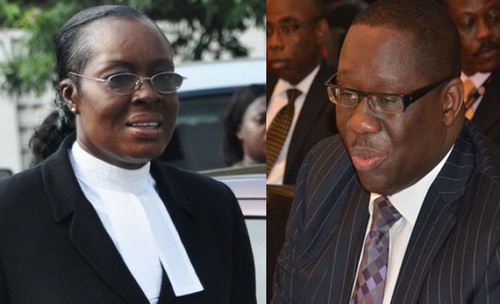
High Court gives A-G two weeks to hand over documents to Ernest Thompson, others
The Accra High Court Wednesday gave the Attorney-General (A-G) two weeks to make all relevant documents available to all the accused former staff of the Social Security and National Insurance Trust (SSNIT) standing trial for allegedly causing financial loss to the state.
The court said the release of the requisite documents to the defence team would enable them to put up effective defence in the trial.
The court’s order came after it had enquired from the Director of Public Prosecution (DPP), Mrs Yvonne Atakora Obuobisa, if the A-G had been able to go by its December 14, 2018 order to furnish the defence with the documents they had requested.
Responding, Mrs Obuobisa told the court that the A-G had received quite a number of the documents from the Social Security and National Insurance Trust (SSNIT) and had made them available to the defence.
She, however, said SSNIT had informed the A-G they were still working to get the rest of the documents, saying that “I believe in about two weeks they should be able to give us what is left and the court will be informed accordingly.”
Mrs Obuobisa, therefore, prayed the court, presided over by Mr Justice Henry Kwofie, to give the A-G two weeks to furnish the defence with the documents they required.
The court adjourned the hearing to February 13, 2019.
Previous order
At the previous hearing of the case on December 14, 2018, the court granted an application by Ernest Thompson, a former Director-General of SSNIT, who requested for certain documents from the prosecution.
The court consequently ordered the prosecution to release about 111 documents requested by the defence.
Background
Thompson and four others - John Hagan Mensah, a former Information Technology Manager at SSNIT; Juliet Hassana Kramer, the Chief Executive Officer of Perfect Business Systems (PBS); Caleb Kwaku Afaglo, a former Head of Management Information Systems (MIS) at SSNIT, and Peter Hayibor, the lawyer for SSNIT, are standing trial for charges including procurement breaches over the SSNIT Operational Business Suite (OBS) project.
All the accused, who are on self-recognisance bail, have pleaded not guilty to 29 charges, including wilfully causing financial loss to the state, defrauding by false pretence, contravening the Public Procurement Act, 2003 (Act 663) and conspiracy.
Request for documents
On October 22, 2018, Mrs Obuobisa, released about 127 documents that the prosecution would use to conduct its case to the defence counsel.
The move by the DPP was in compliance with a landmark judgement by the Supreme Court on June 7, 2018 that made pre-trial disclosures a must in all criminal cases to enable accused persons to effectively defend themselves.
However, at December 14, 2018 hearing, counsel for Thompson, Mr Samuel Cudjoe, explained that although the prosecution had provided documents to the defence, there were still certain essential documents that had not been provided.
“The prosecution supplied us with the contract, but pages 2-34 were missing. We want the missing pages,’’ he said.
Other documents, he said, included memos and minutes relating to the OBS project that his client saw and acted upon during his tenure as the Director-General of SSNIT.
Counsel argued that the documents were crucial and essential to the defence of Thompson.
“The prosecution will not have any difficulties obtaining these documents because they are in the possession of SSNIT and the Public Procurement Authority,’’ counsel argued.
Prosecution’s case
In June 2010, SSNIT initiated a $34-million OBS project to use information and communications technology (ICT) to revamp its operations to enable it to provide a modern pension administration system.
It is the case of the A-G that between September 2013 and September 2016, the five accused persons engaged in various illegalities that caused financial loss to the state in relation to the said project.
The contract sum, the A-G argued, also ballooned from $34 million to over $66 million, even though the OBS system failed to perform efficiently as the project contract had envisaged.
